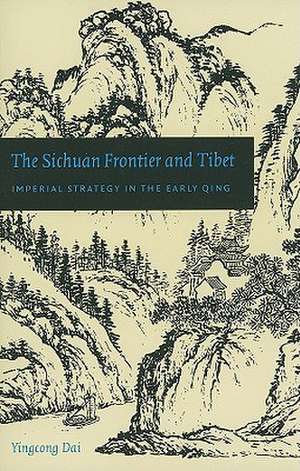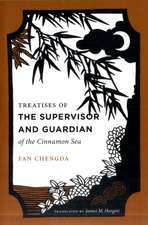The Sichuan Frontier and Tibet – Imperial Strategy in the Early Qing
Autor Yingcong Daien Limba Engleză Paperback – 20 ian 2010
Preț: 266.52 lei
Nou
Puncte Express: 400
Preț estimativ în valută:
51.00€ • 54.54$ • 42.52£
51.00€ • 54.54$ • 42.52£
Carte tipărită la comandă
Livrare economică 17 aprilie-01 mai
Preluare comenzi: 021 569.72.76
Specificații
ISBN-13: 9780295989525
ISBN-10: 0295989521
Pagini: 352
Ilustrații: 2 maps
Dimensiuni: 177 x 228 x 22 mm
Greutate: 0.5 kg
Editura: MV – University of Washington Press
Locul publicării:United States
ISBN-10: 0295989521
Pagini: 352
Ilustrații: 2 maps
Dimensiuni: 177 x 228 x 22 mm
Greutate: 0.5 kg
Editura: MV – University of Washington Press
Locul publicării:United States
Cuprins
Acknowledgments; Reign Dates of the Qing Dynasty, 1636-1911 Introduction; 1. A Humble Beginning, 1640-1696; 2. A Strategic Turn from the Steppe to Tibet, 1696-1701; 3. The Formative Era, 1701-1722; 4. Realignment in the Yongzheng Period, 1723-1735; 5. The Shaping of Independence in the Qianlong Period, 1736-1795; 6. The Military Presence in Society and Economy; 7. The Benefit and Cost of Imperial Strategy; Epilogue Abbreviations Used in Notes and Bibliography; Notes; Glossary; Bibliography; Index
Recenzii
"No other study so comprehensively links the expansion of the Southwest to the core security concerns of the Qing elite. This pioneering work adds greatly to our understanding of how the Qing constructed and maintained its vast territorial reach. It is a well-crafted narrative which shows the extensive local effects of central court decisions. Both Qing and modern historians will find important insights in this study about the Chinese state's preoccupation with administrative integration and fiscal stability. Most important, it demonstrates clearly the fundamental importance of military institutions and policies for the formation of the empire." Peter C. Perdue, Yale University"An excellent contribution to the field of Qing history. This is regional history at its best. Dai's study both engages and transcends local concerns, showing how regional histories are directly affected by national and international considerations." Laura Hostetler, University of Illinois at Chicago
"No other study so comprehensively links the expansion of the Southwest to the core security concerns of the Qing elite. This pioneering work adds greatly to our understanding of how the Qing constructed and maintained its vast territorial reach. It is a well-crafted narrative which shows the extensive local effects of central court decisions. Both Qing and modern historians will find important insights in this study about the Chinese state's preoccupation with administrative integration and fiscal stability. Most important, it demonstrates clearly the fundamental importance of military institutions and policies for the formation of the empire." Peter C. Perdue, Yale University "An excellent contribution to the field of Qing history. This is regional history at its best. Dai's study both engages and transcends local concerns, showing how regional histories are directly affected by national and international considerations." Laura Hostetler, University of Illinois at Chicago
"No other study so comprehensively links the expansion of the Southwest to the core security concerns of the Qing elite. This pioneering work adds greatly to our understanding of how the Qing constructed and maintained its vast territorial reach. It is a well-crafted narrative which shows the extensive local effects of central court decisions. Both Qing and modern historians will find important insights in this study about the Chinese state's preoccupation with administrative integration and fiscal stability. Most important, it demonstrates clearly the fundamental importance of military institutions and policies for the formation of the empire." Peter C. Perdue, Yale University "An excellent contribution to the field of Qing history. This is regional history at its best. Dai's study both engages and transcends local concerns, showing how regional histories are directly affected by national and international considerations." Laura Hostetler, University of Illinois at Chicago
Notă biografică
William Paterson University, New Jersey
Descriere
A detailed, objective analysis of China's historical relationship with Tibet











